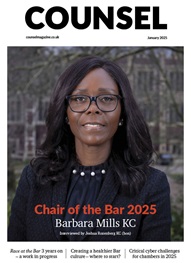*/
Profession
Ministers have embarked on a wholesale review of legal services regulation, following concerns over its complexity and the “unnecessary burdens” it places on the sector.
In a written statement to the House of Commons on 3 June, Justice Minister Helen Grant announced that the review would consider how to simplify the framework, whilst retaining “appropriate regulatory oversight”. The full breadth of the legislative framework is in scope, which is underpinned by at least 10 pieces of primary legislation and over 30 statutory instruments.
The Ministry wants to hear comments on the interaction between the legislative framework and the detailed rules and regulations of the approved regulators, licensing authorities and the Legal Services Board (LSB) and Office for Legal Complaints, “although we recognise that these are not owned by the Ministry of Justice,” Grant said.
A call for evidence kicks off the review. Ministers will decide next steps following an analysis of views and is seeking feedback from all involved in regulating, monitoring and providing legal services (email: legalservicesreview@justice.gsi.gov.uk).
Currently, the supra regulator, the LSB, oversees all eight frontline legal regulators in England and Wales, and the Office for Legal Complaints. It is independent of government and the legal profession and came into being in 2010, created by the Legal Services Act 2007. There have been tensions and complaints over duplication in the regulatory state for some time. At a Justice Committee evidence session into the work of the LSB in March, its Chairman David Edmonds recommended that Parliament should set up a single body, absorbing all eight frontline regulators.
Meanwhile, the Bar Standards Board (BSB) has passed its first performance review in each category. Edmonds praised the BSB’s “welcome frankness” in its self-assessment and said its challenging work programme showed “a high, but necessary, level of ambition”. He warned, however, that the proposed timescale was “tight” and would be dependent on “significant leadership being shown by the Board of the BSB coupled with strong management by the executive”. The BSB must do more, he added, to embed the regulatory standards and an outcomes focused regulatory approach into its day-to-day operations.
In a written statement to the House of Commons on 3 June, Justice Minister Helen Grant announced that the review would consider how to simplify the framework, whilst retaining “appropriate regulatory oversight”. The full breadth of the legislative framework is in scope, which is underpinned by at least 10 pieces of primary legislation and over 30 statutory instruments.
The Ministry wants to hear comments on the interaction between the legislative framework and the detailed rules and regulations of the approved regulators, licensing authorities and the Legal Services Board (LSB) and Office for Legal Complaints, “although we recognise that these are not owned by the Ministry of Justice,” Grant said.
A call for evidence kicks off the review. Ministers will decide next steps following an analysis of views and is seeking feedback from all involved in regulating, monitoring and providing legal services (email: legalservicesreview@justice.gsi.gov.uk).
Currently, the supra regulator, the LSB, oversees all eight frontline legal regulators in England and Wales, and the Office for Legal Complaints. It is independent of government and the legal profession and came into being in 2010, created by the Legal Services Act 2007. There have been tensions and complaints over duplication in the regulatory state for some time. At a Justice Committee evidence session into the work of the LSB in March, its Chairman David Edmonds recommended that Parliament should set up a single body, absorbing all eight frontline regulators.
Meanwhile, the Bar Standards Board (BSB) has passed its first performance review in each category. Edmonds praised the BSB’s “welcome frankness” in its self-assessment and said its challenging work programme showed “a high, but necessary, level of ambition”. He warned, however, that the proposed timescale was “tight” and would be dependent on “significant leadership being shown by the Board of the BSB coupled with strong management by the executive”. The BSB must do more, he added, to embed the regulatory standards and an outcomes focused regulatory approach into its day-to-day operations.
Profession
Ministers have embarked on a wholesale review of legal services regulation, following concerns over its complexity and the “unnecessary burdens” it places on the sector.


Barbara Mills KC, the new Chair of the Bar, outlines some key themes and priorities
Rachel Davenport, Co-founder and Director at AlphaBiolabs, discusses the role that drug, alcohol and DNA testing can play in non-court dispute resolution (NCDR)
Casey Randall explores what makes AlphaBiolabs the industry leader for court-admissible DNA testing
By Louise Crush of Westgate Wealth Management
A family lawyer has won a £500 donation for her preferred charity, an education centre for women from disadvantaged backgrounds, thanks to drug, alcohol and DNA testing laboratory AlphaBiolabs’ Giving Back campaign
Louise Crush of Westgate Wealth Management highlights some of the ways you can cut your IHT bill
What's it like being a legal trainee at the Crown Prosecution Service? Amy describes what drew her to the role, the skills required and a typical day in the life
Barbara Mills KC wants to raise the profile of the family Bar. She also wants to improve wellbeing and enhance equality, diversity and inclusion in the profession. She talks to Joshua Rozenberg KC (hon) about her plans for the year ahead
Are Birmingham’s Intensive Supervision Courts successfully turning women offenders’ lives around? Chloe Ashley talks to District Judge Michelle Smith
Professor Dominic Regan and Seán Jones KC identify good value bottles across the price spectrum – from festive fizz to reliable reds
Governments who play fast and loose with the law get into real trouble, says the new Attorney General. The Rt Hon Lord Hermer KC talks to Anthony Inglese CB about what drew this boy from Cardiff to the Bar, bringing the barrister ethos to the front bench, and how he will be measuring success